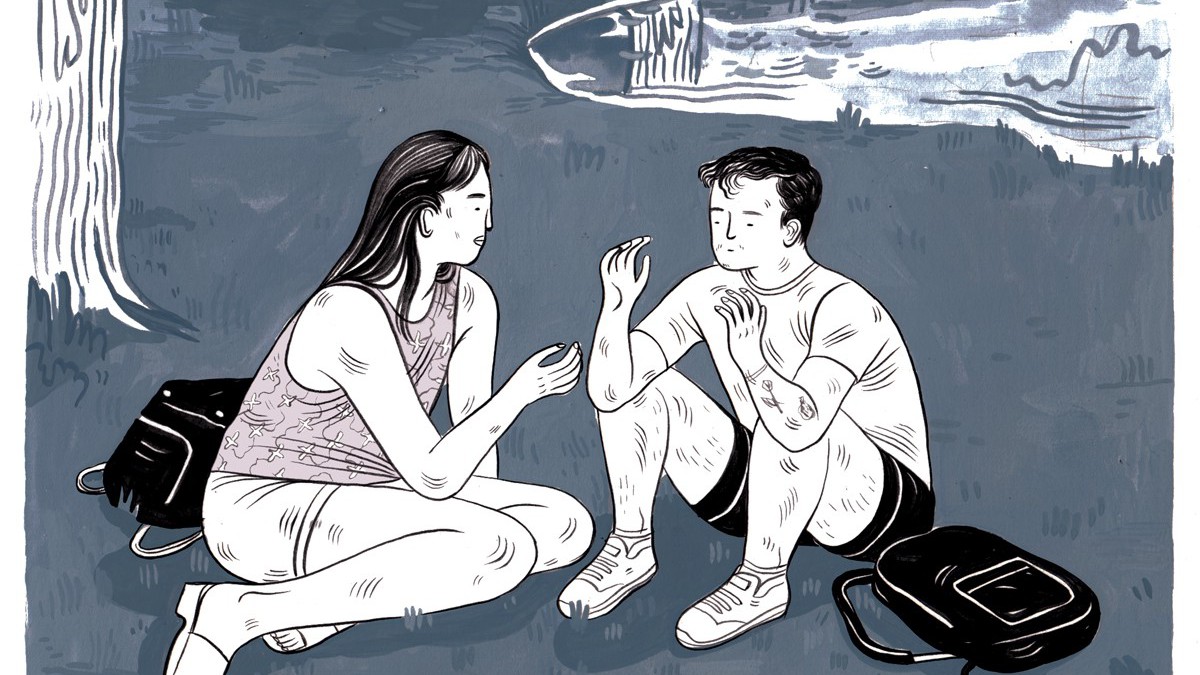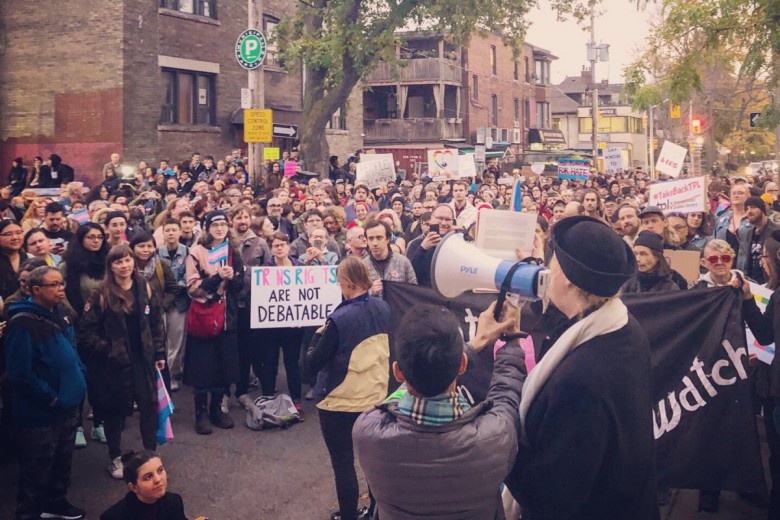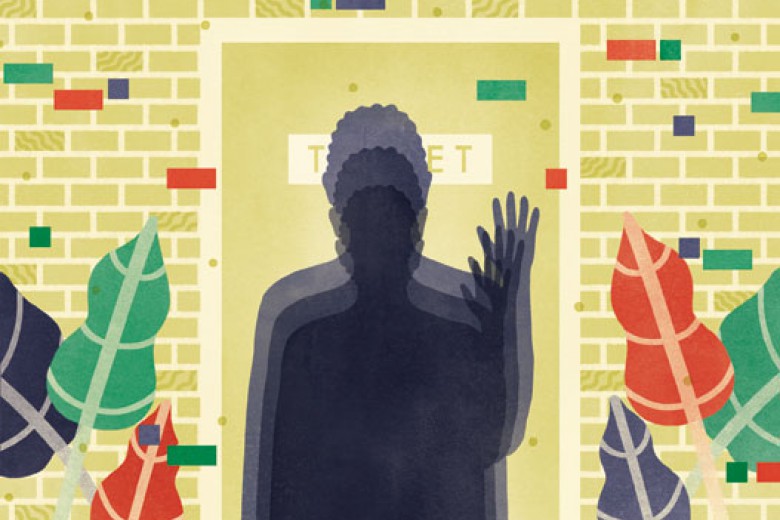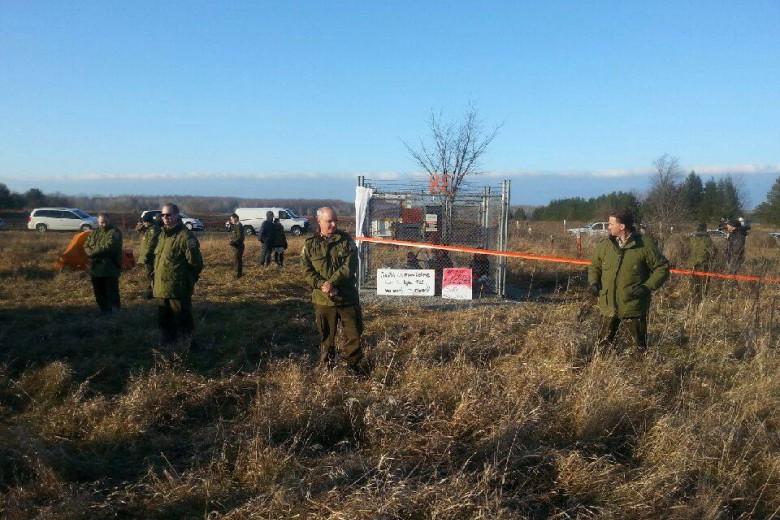“Okay, let’s do something about it.”
I cherish moments like this: two trans friends talking about changing the world. “When I realized you were just as pissed as I was, I knew this was a big issue we needed to address,” explains my friend Rene. We’re sitting in Parc Outremont reflecting on how, in a few short weeks, we went from being isolated individuals experiencing transphobia at our local YMCA to galvanizing community support, creating spaces for solidarity, presenting our concerns to the YMCAs of Québec’s higher administration, and having them respond with a draft plan for building a more trans-inclusive YMCA.
It’s an amazingly powerful experience to challenge exclusion, and to realize the strength of your community of trans friends – new and old – and cis allies. It can also be some of the most emotionally exhausting work. During these weeks, I cried, burnt myself out, and at times doubted the effectiveness of everything we had done and were doing.
“It’s an amazingly powerful experience to challenge exclusion, and to realize the strength of your community of trans friends – new and old – and cis allies.”
After I posted on Facebook in April about an experience of transphobia at my local YMCA, I was swept away by the outpouring of support and stories from trans, non-binary, and gender non-conforming friends about similar and much more extreme experiences of transphobia. People told me about being kicked out of change rooms, being forbidden from having their names or genders recognized, being denied access to women-only spaces, being misgendered, experiencing physical violence and verbal harassment from other gym-goers and staff, and being asked invasive questions about their bodies and surgical history.
In every arena of the world, trans people have to navigate systems that were never designed with us in mind – or were designed specifically to exclude us. A 2015 Trans PULSE study reported that 20 per cent of trans people in Ontario had experienced physical or sexual assault for being trans, and 34 per cent had been verbally threatened or harassed. Approximately two-thirds had avoided public spaces for fear of being outed and experiencing harassment, and one-third of trans Ontarians reported having to move away in order toaccess services or escape harassment.
Statistics show that being bullied and terrorized out of access to services and safe space is a constant reality for trans people. Access to a trans-friendly gym may not be the first priority for everyone organizing around trans safety, but it’s still an important one. Everywhere you look, trans people’s health is de-prioritized – in access to mental health services, gender-affirming medications or surgery, or, yes, gyms. It often seems that only cis bodies “deserve” health. Gyms – spaces where we undress, sweat, reckon with our bodies, struggle toward fitness and longevity – are spaces of vulnerability, where the risk of assault and harassment is especially heightened for trans people.
Trans people are long overdue for a system overhaul with us in mind. Within 24 hours of my Facebook post, we had an email list of 20 trans people wanting to gather to discuss what we should do to push gyms in the city to be more trans-inclusive. A week later, six trans friends gathered around my cramped kitchen table to plot our next steps.
Trans people are long overdue for a system overhaul with us in mind.
We quickly rallied friends and allies to email the YMCA administration, demanding they take immediate action to make the institution more inclusive of trans people. Within a few short days, the vice president of health, fitness and aquatics for YMCAs of Québec and the centre director of the YMCA du Parc (the location where I experienced the transphobia) agreed to meet with us to discuss these issues. Our group prepared a seven-page letter containing 13 demands for steps the YMCA could take to be more inclusive of trans members. They included allowing access to the family change room, training for all staff, stopping the collection of information about people’s gender, hiring trans staff, and respecting members’ names and pronouns.
In many ways, our meetings with the YMCA administration were a victory. For example, they clarified that there is, in fact, no rule barring members from having a name or gender different from the legal name on their card and in their file. On the other hand, I quickly realized how a lack of knowledge and a lot of fear prevent institutions like the YMCA from expanding access to trans people.
“I’m a little scared talking to you,” one of the YMCA administrators admitted to us near the end of our second two-hour meeting. “Why do you think she was scared of us?” I ask Rene, weeks later, at our debrief in the park. It evokes a familiar feeling of confusion and exhaustion. We wonder how an institution that prides itself on inclusivity could have neglected to consider a system-wide approach to trans inclusion for so long.
Two passersby stare at us in our tight shorts and flirty summer shirts. Rene turns to me and declares, “People are used to trans people coming from this place of vulnerability – but we didn’t come to them with that. We came prepared and researched. I think being trans and that empowered intimidates people.”
I smile again, thinking about how lucky I am to be surrounded by so many empowered trans people.
I invite my friend Mich – one of the transfriends I’m lucky to have in my community – out for lunch at a local Mexican snack bar. We sit on the veranda, awkwardly close to a family that’s out for Sunday lunch. Mich’s mesh tank top, little acid-washed jean shorts, and flowing brown hair make her stand out against the buttoned-up yuppie parents and hipster art bros.
Everywhere you look, trans people’s health is de-prioritized – in access to mental health services, gender-affirming medications or surgery, or, yes, gyms.
“When I first signed up for the Y, I saw you had to select a gender and I asked if it was okay if I didn’t answer, and they said no,” Mich tells me. We both laugh at the familiarity of coming up against people who lack the understanding, and institutions that are devoid of the processes, to include gender-diverse people.
“When I go to the gym, I negate myself – my identity – completely for the benefit of my physical and mental well-being,” Mich laments. When I ask why she prefers the men’s change room, Mich responds, “Because there’s a steam room! I also identify as a woman and two-spirit, which means existing and identifying within supposedly opposing sides of the spectrum. So I do feel elements of comfort [being in a men’s space], but it’s a tricky thing.” We giggle and reminisce about the time we ran into each other in the men’s steam room: two strong trans women gossiping and occupying space.
In a more sombre moment, Mich admits, “If I were to use the women’s change room I can imagine the onslaught of rich white women being so offended – and that being the most uncomfortable experience ever. I don’t know … I’m sad it’s the way it is. It shouldn’t be that way, not now.”
She’s right – it shouldn’t be this way, not now. With the passage of Bill C-16 in October 2016, gender identity and presentation were affirmed as protected classes in the Canadian Human Rights Act and Criminal Code. In Quebec, the Charter of Human Rights and Freedoms additionally forbids harassment and discrimination based on gender identity and expression in the province. Of course, as most marginalized communities know, legal protections don’t necessarily translate into more inclusive and empowering systems, interactions with individuals, or cultural norms. Additionally, living with such a top-down system of recourse for gender-based discrimination, it often takes an individual or group with the social, cultural, and financial resources necessary to take advantage of these new protections via a legal claim.
“When I go to the gym, I negate myself – my identity – completely for the benefit of my physical and mental well-being.”
My own experience of signing up with the YMCA is one example. While renewing my then-expired membership, I was surprised to read in the contract that the family change room, the sole gender-neutral facility in the building, was only for adults who were accompanied by children under the age of 12. When I questioned the policy, the front desk staffer assured me that yes, in fact, that was “the rule.” Pushing aside the awkwardness and anxiety that comes with outing oneself to a complete stranger in order to access a service, I told her I was transitioning and would prefer to use a gender-neutral facility as my body changed. While she was sympathetic, she told me that would not be permitted.
A few weeks later, after our first successful meeting, in which the YMCA administration cleared up the rules around names on membership cards, I walked confidently up to the front desk and asked that my card be changed to reflect my real name. The staffer looked at me inquisitively and asked if I was “lying” when I told her the director of the centre had assured me this was allowed. I was not lying – in what world would I lie to deliberately experience the awkwardness, anxiety, and risk of violence inherent in so assuredly presenting myself as a trans woman? Luckily, I walked out of the YMCA with an ID – my first ID – that uses my real name. It was a hard-fought moment of joy.
Being trans is tough and it’s beautiful. We live in a highly gender-regulated world, where stereotypes, falsehoods, and misplaced concerns for the safety of cisgender women – as opposed to all women – continue to dictate the policies of institutions like the YMCA. When contacted for a quote for this article, the administration’s response affirmed that, “we are committed to providing an inclusive environment to all. The work, actions, consultations and research necessary to develop a coherent plan are presently in the works.”
Of course, as most marginalized communities know, legal protections don’t necessarily translate into more inclusive and empowering systems, interactions with individuals, or cultural norms.
While the statement sounds promising, the absence of a single mention of the trans community is telling. Why are institutions so afraid of explicitly and unequivocally welcoming trans people specifically? Why are we grouped under the vague category of “all,” when the violence we face and the protections we seek are particular? When will the trans community be given more than platitudes and vague promises?
While we wait for the YMCA administration to release to the public their approved plan for institutional change, trans people in Quebec and beyond will continue to find ways to exist in a world structured around our exclusion – whether that means hiding ourselves, cladding ourselves in armour, fearlessly demanding access to spaces we have every right to occupy, finding comfort and power in community, or leveraging human rights protections and the media. Make space for us or we will make it for ourselves.




_780_520_90_s_c1_c_c.jpg)


